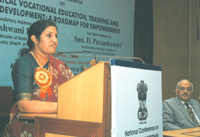Even though it’s well-known that the great majority of school leavers in the western world opt for vocational education and training, and Indian industry is experiencing an unprecedented shopfloor skills shortage, formal vocational training continues to remain the blindspot of the education system. This was admitted by D. Purandeswari, Union minister of state for human resource development, at a two-day seminar organised by the All India Council for Technical Education (AICTE) in Delhi on December 17-18, to discuss a roadmap for vocational education, training and skills development.
 “Despite the fact that the significance of vocational education was acknowledged way back in 1956 when UGC was formed, and the Kothari Commission identified it as a focus area in 1966, we continue to discuss the disheartening challenges facing vocational education and training in the country. A National Qualification Framework is needed to address various issues of manpower assessment and training, and to facilitate lifelong learning of workers. It will also help enterprises and employment agencies to match skills demand with supply, and develop a credible industry-based system of training and assessment,” said Purandeswari in her keynote address to the seminar.
“Despite the fact that the significance of vocational education was acknowledged way back in 1956 when UGC was formed, and the Kothari Commission identified it as a focus area in 1966, we continue to discuss the disheartening challenges facing vocational education and training in the country. A National Qualification Framework is needed to address various issues of manpower assessment and training, and to facilitate lifelong learning of workers. It will also help enterprises and employment agencies to match skills demand with supply, and develop a credible industry-based system of training and assessment,” said Purandeswari in her keynote address to the seminar.
Currently only 10 percent of India’s 457 million workers employed in the organised sector of industry earn living wages and only 2 percent of the country’s workforce receives pre-employment skills training against 96 percent in Korea, 75 percent in Germany, 80 percent in Japan and 68 percent in the UK. Similarly, against 12.8 million new entrants into the workforce annually, skills training capacity in the country is limited to a mere 3.1 million. According to labour ministry estimates, by 2022 the Indian economy will require about 500 million trained workers, which means that vocational education capacity has to grow ten-fold to meet this requirement. Another startling revelation made at the seminar was that less than 3 percent of students in higher secondary education opt for vocational or skills training before entering the labour market. Moreover against the requirement of 60,000 master trainers per year, the output is a mere 1,500.
Behind these dismal statistics testifying to the criminal neglect of vocational education (VE) in post-independence India, is a sorry tale of the VE ball being tossed between 30 ministries of the Central and state governments. It’s only recently that the HRD ministry and AICTE have discovered that the Union labour ministry is the nodal centre for vocational and skills education. But neither the labour nor commerce ministers, who were scheduled to speak at the AICTE seminar, attended.
Nevertheless the high-powered seminar highlighted some positives as well. Skills development is now an agenda item on the PM’s development council, with the Planning Commission also working on it, and a Rs.22,800 crore Skills Development Mission is being planned. On its part, the HRD ministry announced a scheme to promote 1,000 new polytechnics countrywide, of which 400 will be promoted by private sector educationists.
“The government will encourage community polytechnics, new study programmes and scale up distance education. But society must also begin showing respect for skilled manpower which is required to provide a big boost to vocational education in the country,” said R.P. Agarwal, secretary higher education, while advocating movement of workers from industry to education and vice-versa.
R.A. Yadav, chairman AICTE, speaking at the seminar, called upon the IITs to begin training master trainers for vocational education. “Vocational education carries with it the historical baggage of being associated with school drop-outs, academic under-performers, and cheap labour for entry level jobs. This has to change with educational and social responsibility coming together to empower people at the grassroots,” said Yadav.
Yet given the continuous neglect of vocational education and institutional training for over five decades, it will take more than fine speeches to actually deliver skills training to India’s short-changed youth.
Autar Nehru (Delhi)